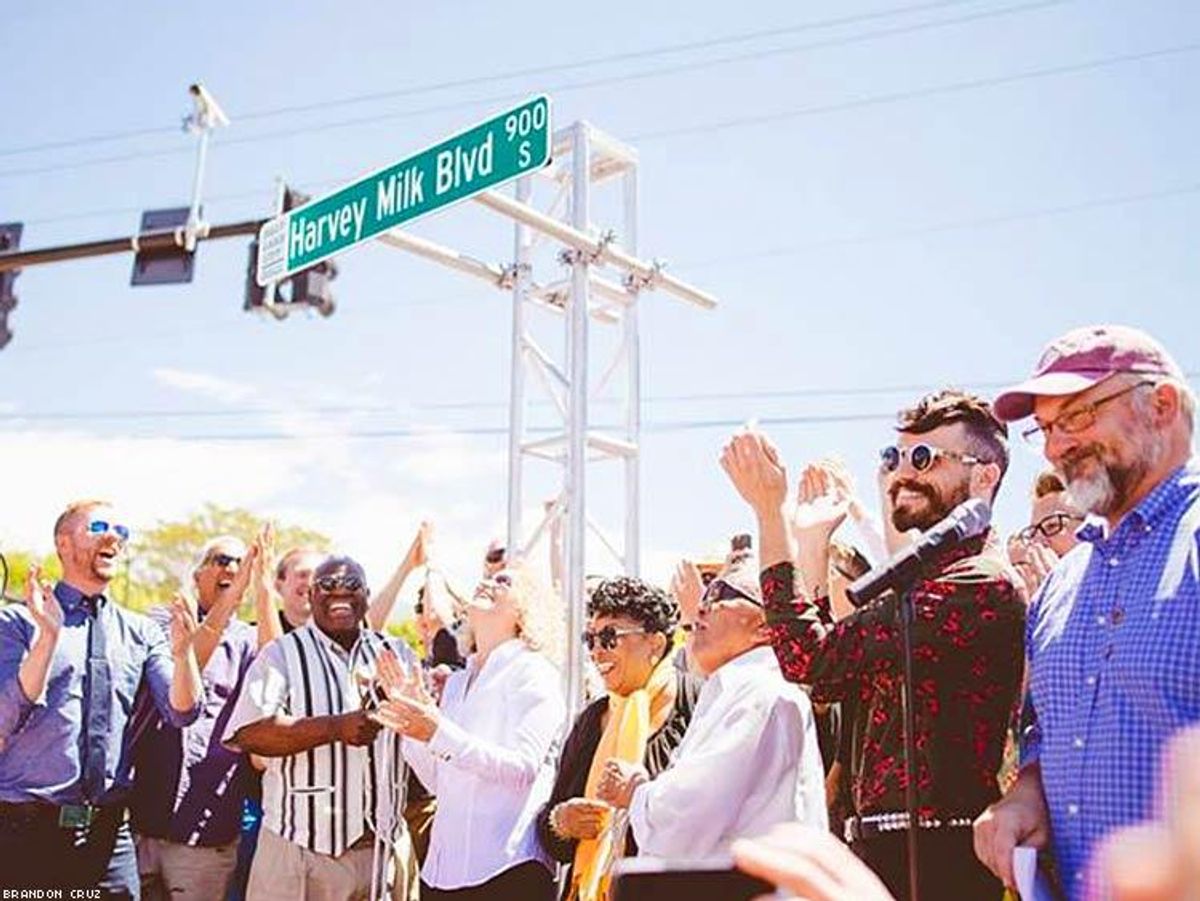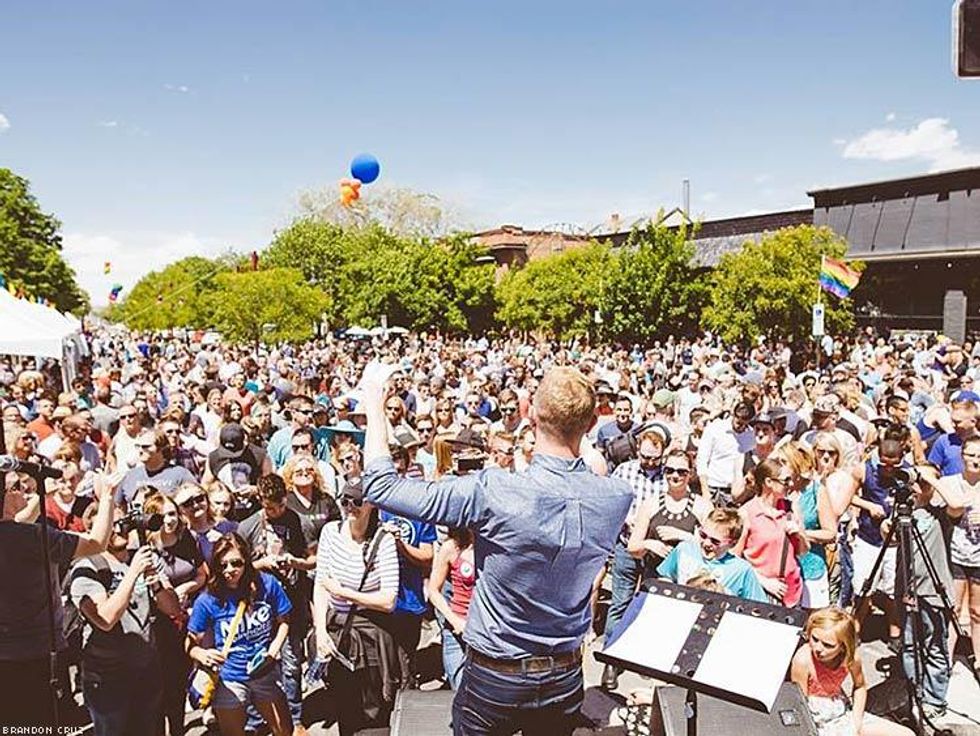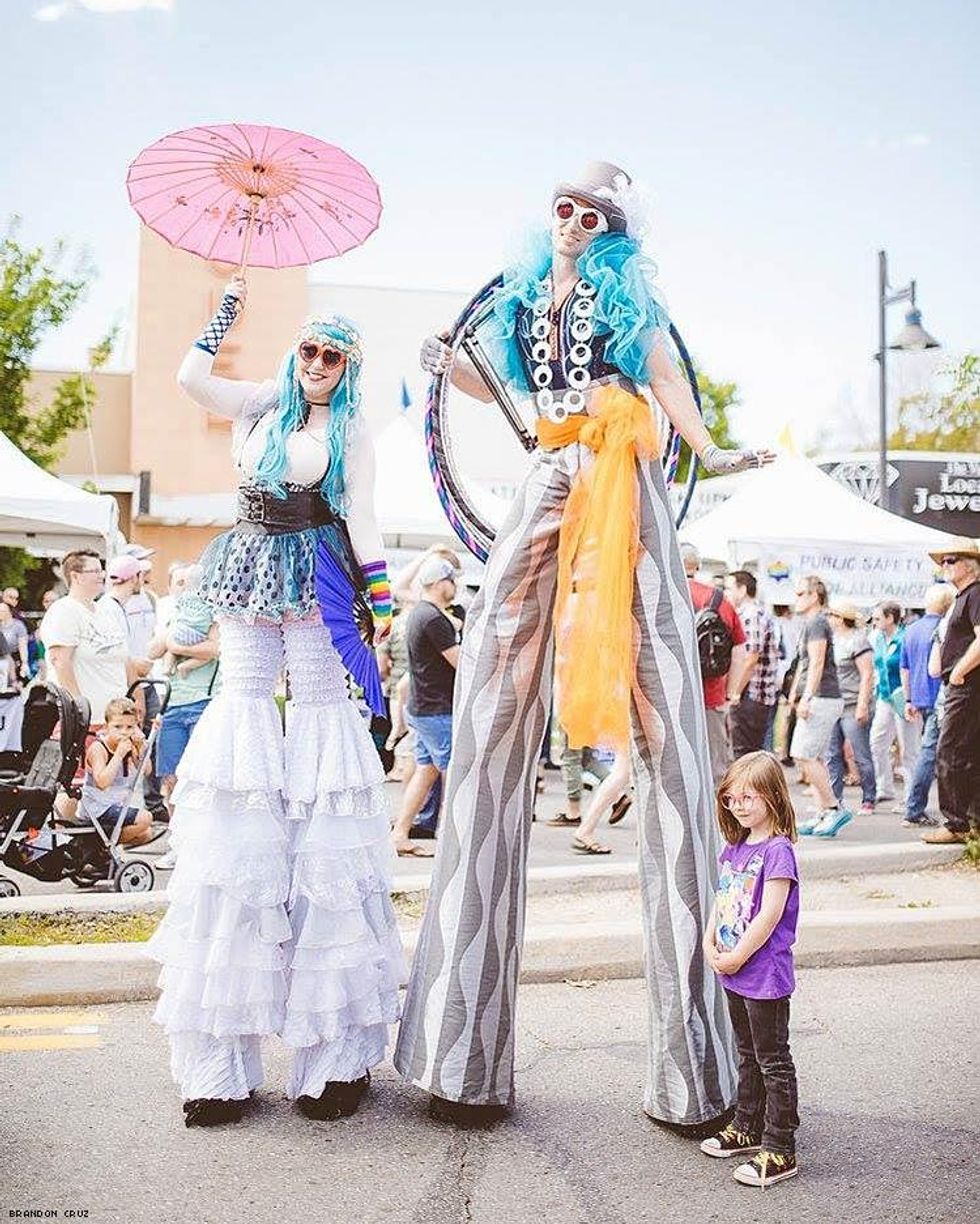Bringing Harvey Milk Boulevard to 20 blocks in downtown Salt Lake City wasn't a radical proposal. Despite being the capital city of one of the reddest states in the nation, SLC is wildly progressive. Even though we are home to the world headquarters of the Church of Jesus Christ of Latter-day Saints (Mormons), SLC is one of the most LGBTQ-affirming cities in America. In fact, we are pretty damn gay. According to the 2015 Gallup survey, we're the seventh gayest city in the country. We're gayer than Los Angeles and Manhattan (per capita of course)!
Utah's LGBTQ community has also made bold leaps toward equality. In 2013, we were the first state to overturn a marriage ban after the Windsor decision. In 2015, we became the only state with a Republican-controlled legislature to pass an LGBTQ nondiscrimination bill covering employment and housing. We're a community of irrational optimists. We know the odds are stacked against us, but we don't care. We keep fighting to create a fair and just Utah. It's a preservation of hope and a quality of tenacity we learned from Harvey.
In 2014, Equality Utah approached SLC Mayor Ralph Becker with a simple proposal: Let's bring Harvey Milk Boulevard to a prominent downtown street. Our city had already renamed major arterials after civil rights luminaries Martin Luther King Jr., Rosa Parks, and Cesar Chavez. Mayor Becker agreed. He had championed LGBTQ rights during his tenure, bringing a mutual commitment (read: domestic partner) registry in 2008 and more notably passing the state's first municipal nondiscrimination ordinance in 2010, providing protections in housing and employment. And in 2013, when our marriage ban fell, Mayor Becker was the first to rush to the County Building to begin marrying ecstatic couples. He was eager to get the ball rolling.
We also had advocates on the City Council, including Stan Penfold, who like Harvey in San Francisco was the first openly gay council member. Recognizing his debt to Harvey, Penfold took up the cause with fervor. In 2016, the city elected our second gay council member, Derek Kitchen, who was a lead plaintiff in the landmark case that overturned our marriage ban. Together, the two worked closely with our team at Equality Utah to make the case for Harvey.
The remainder of the council -- including three Mormons -- didn't need much persuading. The city was ready, and the community was eager. By last November voters had even elected SLC's first lesbian mayor, Jackie Biskupski. It was time to bring Harvey to town. And on April 19, the City Council, in front of a packed house, voted unanimously for "Harvey Milk Boulevard."
 It was important that the street name be owned by our entire community. Harvey's legacy, after all, belongs to all of us. So when we set up a crowdfunding site to pay for the new street signs, we raised the needed $8,000 in less than a week with contributions from 131 individuals.
It was important that the street name be owned by our entire community. Harvey's legacy, after all, belongs to all of us. So when we set up a crowdfunding site to pay for the new street signs, we raised the needed $8,000 in less than a week with contributions from 131 individuals.
Last Saturday, Equality Utah brought the community together for the official dedication and, of course, block party. We celebrated, as we are wont to do, with music, booths, food trucks, and a rally with speakers inspired by what Harvey referred to as the "Coalition of the Us's" made up of local chapters of the NAACP, the Coalition of La Raza, Transgender Education Advocates of Utah, and others. The ceremony was punctuated by SLC's resident gay rock star, Tyler Glenn from Neon Trees. Glenn brought the crowd to tears with emotionally raw performances of David Bowie's "Changes" and Louis Armstrong's "What a Wonderful World."
The afternoon was packed with politicians, drag queens, stilt walkers, magicians, and capoeira performers -- and even a pair of Mormon missionaries stopped by on their bikes to visit. In SLC, we welcome all to the party.
It's a queer new world.
Harvey Milk Boulevard now extends through one of our city's most beloved neighborhoods, the charm and character of which was built by many LGBTQ-owned businesses. On the east, we have the popular gay-owned Coffee Garden, which sits snug between the gay-owned novelty store Cahoots and the lesbian-owned art house the Tower Theatre. The queer-owned Centered-City Yoga is up just half a block. A Mormon family owns Dolcetti Gelato on the corner with an entrance sign that reads, "Because of our religious beliefs we chose to serve everyone!"
On the west side of Harvey Milk Boulevard is a newly developing area, home to a popular gay bar, Try-Angles. Fqrther west, Councilmember Kitchen and his husband, Moudi Sbeity, are preparing to open Laziz Kitchen, a Lebanese restaurant, next door to the soon-to-be relocated lesbian-owned small plates restaurant Meditrina. This month, just a half block around the corner from Harvey Milk Boulevard, the Volunteers of America are opening a beautiful new shelter to serve our homeless youth population.
As Harvey said, the American Dream begins with neighborhoods. And that is what's happening on our new boulevard. We are fostering new entrepreneurs, building communities, honoring diverse heroes, and serving those in need. And the timing couldn't be better.

If Harvey were still with us, there is no doubt he would be yelling from his megaphone, "Come out! The work is not over!" Despite the tremendous victories we have enjoyed, our movement is witnessing a formidable backlash. As it has happened in North Carolina, Utah's transgender population is being maligned by right-wing fearmongers instigating bathroom hysteria. In 2017, we expect to see legislation specifically targeting our transgender youth. We must circle the wagons to defend them at all costs.
Our state is also facing an epidemic of LGBTQ suicides. We have a population of young people who can't see a positive future for themselves. Targeted by politicians and exiled by their faith, they can't see a world where they belong. But as Harvey pleaded, we have to give them hope. When they feel alone and vulnerable, we have to shine and provide them respite. Because all of us have a responsibility to create that positive future for them. We must help them discover the inner strength they don't yet know they have.
In Utah, we want Harvey Milk Boulevard to become that beacon of hope to every LGBTQ and marginalized youth. We want them all to know that they have value, they are loved, and like Harvey, they too can change the world.
We are sending a loud message to everyone in our state: We are Utah's LGBTQ community and we are here to recruit you!
TROY WILLIAMS is the executive director of Equality Utah. Follow him on Twitter @TroyWilliamsUT.


 It was important that the street name be owned by our entire community. Harvey's legacy, after all, belongs to all of us. So when we set up a crowdfunding site to pay for the new street signs, we raised the needed $8,000 in less than a week with contributions from 131 individuals.
It was important that the street name be owned by our entire community. Harvey's legacy, after all, belongs to all of us. So when we set up a crowdfunding site to pay for the new street signs, we raised the needed $8,000 in less than a week with contributions from 131 individuals.
















































































Viral post saying Republicans 'have two daddies now' has MAGA hot and bothered